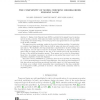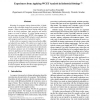861 search results - page 42 / 173 » Polymorphic Time Systems for Estimating Program Complexity |
SENSYS
2006
ACM
15 years 8 months ago
2006
ACM
Event-driven programming is a popular model for writing programs for tiny embedded systems and sensor network nodes. While event-driven programming can keep the memory overhead do...
106
Voted
LMCS
2007
15 years 2 months ago
2007
Higher-Order Fixpoint Logic (HFL) is a hybrid of the simply typed λ-calculus and the modal µ-calculus. This makes it a highly expressive temporal logic that is capable of express...
126
Voted
CORR
2008
Springer
15 years 2 months ago
2008
Springer
A set of N independent Gaussian linear time invariant systems is observed by M sensors whose task is to provide the best possible steady-state causal minimum mean square estimate o...
109
click to vote
ISORC
2007
IEEE
15 years 8 months ago
2007
IEEE
Knowing the program timing characteristics is fundamental to the successful design and execution of real-time systems. Today, measurement-based timing analysis tools such as in-ci...
137
click to vote
MVA
2007
15 years 3 months ago
2007
In this paper we present an evaluation method for stereo matching systems and sensors especially for real world indoor applications. We estimate ground truth reference images by i...



